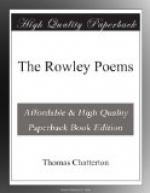Finally, he was no free-liver in the sense in which that objectionable expression is used. Rather he was an ascetic who studied and wrote poetry half through the night, who ate as little as he slept, and would make his dinner off ‘a tart and a glass of water.’ He was devoted to his mother and sister and to his poetry; and what spare time was not occupied with the latter he seems to have spent largely with the former. The attempt to represent him as a sort of provincial Don Juan—though in the precocious licence of a few of his acknowledged writings he has even given it some colour himself—cannot be reconciled with the recorded facts of his life.
Equally ill judged is that picture which is presented by Professor Masson and other writers less important—of a truant schoolboy, a pathetic figure, who had petulantly cast away from him the consolations of religion. Monsieur Callet, his French biographer, knew better than this: ‘Il fallait l’admirer, lui, non le plaindre,’ is the last word on Chatterton.
[Footnote 1: An extraordinary production for a boy of twelve, but we need not suppose that if ‘Elenoure and Juga’ were written in 1764 and not published until 1769 no alterations and improvements were made by its author in the period between these dates.]
[Footnote 2: From the engraving in Tyrwhitt’s edition.]
[Footnote 3: See Southey and Cottle’s edition, quoted in Skeat, ii, p. 123.]
[Footnote 4: Dean Milles has a delightful account of the reception accorded to Rowley in the Chatterton household. Neither mother nor sister would appear to have understood a line of the poems, but Mary Chatterton (afterwards Mrs. Newton) remembered she had been particularly wearied with a ‘Battle of Hastings’ of which her brother would continually and enthusiastically recite portions.]
[Footnote 5: Wilson believed that Chatterton never sent the Ryse, &c., at all (see page 173 of his Chatterton: A Biographical Study), but this is disposed of by the fact that the Ryse of Peyncteyning is the only piece of Chatterton’s which contains Saxon words.]
[Footnote 6: March 28th, 1769.]
[Footnote 7: An account of Master William Canynge written by Thos. Rowlie Priest in 1460. Skeat, Vol. III, p. 219; W. Southey’s edition, Vol. III, p. 75. See especially the last paragraph.]
[Footnote 8: See Letters of Horace Walpole, edited by Mrs. Paget Toynbee (Clarendon Press), Vol. XIV, pp. 210, 229; Vol. XV, p. 123.]
[Footnote 9: But attorneys are seldom ‘in regrate’ with the friends of Poetry.]
[Footnote 10: Masson’s reconstruction of the scene between Chatterton and the editor of the Freeholder’s Magazine is very convincing (see his Chatterton: a Biography, p. 160).]
[Footnote 11: Almost everything that we know of Chatterton in London was ascertained by Sir H. Croft and printed in his Love and Madness (see Bibliography).]




